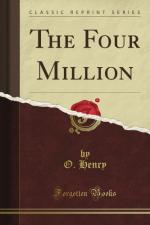Somebody knocked at the door. Dulcie opened it. The landlady stood there with a spurious smile, sniffing for cooking by stolen gas.
“A gentleman’s downstairs to see you,” she said. “Name is Mr. Wiggins.”
By such epithet was Piggy known to unfortunate ones who had to take him seriously.
Dulcie turned to the dresser to get her handkerchief; and then she stopped still, and bit her underlip hard. While looking in her mirror she had seen fairyland and herself, a princess, just awakening from a long slumber. She had forgotten one that was watching her with sad, beautiful, stern eyes—the only one there was to approve or condemn what she did. Straight and slender and tall, with a look of sorrowful reproach on his handsome, melancholy face, General Kitchener fixed his wonderful eyes on her out of his gilt photograph frame on the dresser.
Dulcie turned like an automatic doll to the landlady.
“Tell him I can’t go,” she said dully. “Tell him I’m sick, or something. Tell him I’m not going out.”
After the door was closed and locked, Dulcie fell upon her bed, crushing her black tip, and cried for ten minutes. General Kitchener was her only friend. He was Dulcie’s ideal of a gallant knight. He looked as if he might have a secret sorrow, and his wonderful moustache was a dream, and she was a little afraid of that stern yet tender look in his eyes. She used to have little fancies that he would call at the house sometime, and ask for her, with his sword clanking against his high boots. Once, when a boy was rattling a piece of chain against a lamp-post she had opened the window and looked out. But there was no use. She knew that General Kitchener was away over in Japan, leading his army against the savage Turks; and he would never step out of his gilt frame for her. Yet one look from him had vanquished Piggy that night. Yes, for that night.
When her cry was over Dulcie got up and took off her best dress, and put on her old blue kimono. She wanted no dinner. She sang two verses of “Sammy.” Then she became intensely interested in a little red speck on the side of her nose. And after that was attended to, she drew up a chair to the rickety table, and told her fortune with an old deck of cards.
“The horrid, impudent thing!” she said aloud. “And I never gave him a word or a look to make him think it!”
At nine o’clock Dulcie took a tin box of crackers and a little pot of raspberry jam out of her trunk, and had a feast. She offered General Kitchener some jam on a cracker; but he only looked at her as the sphinx would have looked at a butterfly—if there are butterflies in the desert.
“Don’t eat it if you don’t want to,” said Dulcie. “And don’t put on so many airs and scold so with your eyes. I wonder if you’d be so superior and snippy if you had to live on six dollars a week.”
It was not a good sign for Dulcie to be rude to General Kitchener. And then she turned Benvenuto Cellini face downward with a severe gesture. But that was not inexcusable; for she had always thought he was Henry VIII, and she did not approve of him.




